
How Long Is Engineering School? Different Degrees Timeline
Ever wondered how people design rockets, build highways, or create life-saving devices?
Request Information
Engineering school is where that process begins, preparing students with the skills and mindset needed to build the world around us.
If you’re considering this path, you might ask: how long is engineering school? The answer depends on how far you want to go. The timeline varies, especially if you continue with advanced study.
Key Takeaways
-
Engineering degree timelines vary widely, ranging from 2 years for an associate's degree to 6 years or more for a Ph.D.
-
Hands-on experience through internships or co-ops can extend study time, but it also significantly boosts career prospects.
-
Choosing a program aligned with your career goals is essential, and UND offers a diverse range of engineering options to support your journey.
How Long Are Different Engineering Degrees
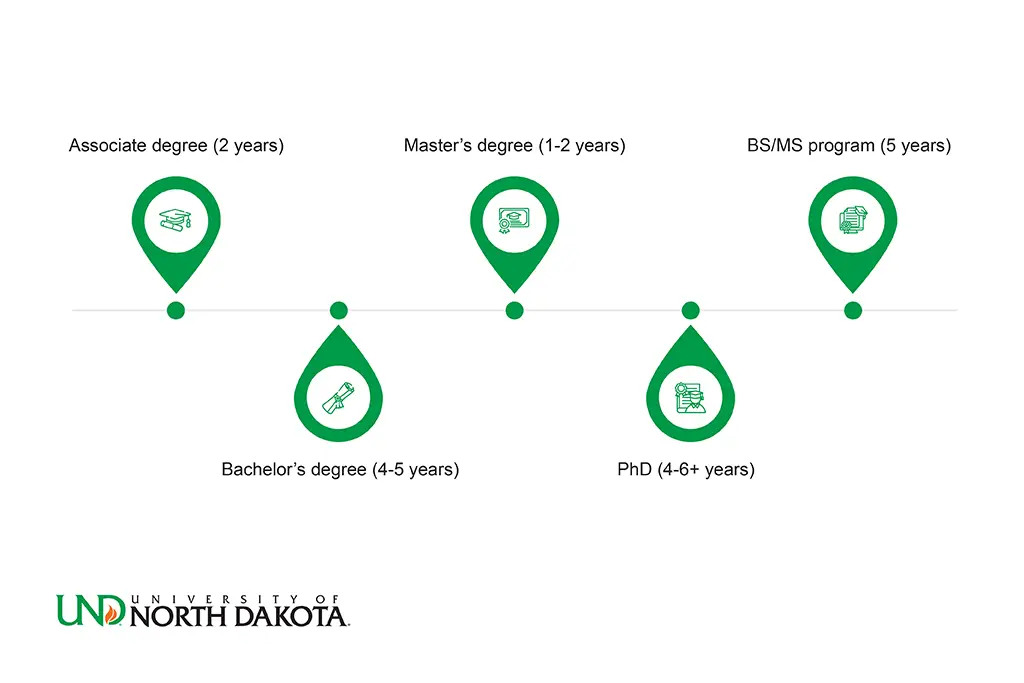
The time it takes to complete engineering school depends on the degree you pursue. Associate's degrees usually take 2 years, bachelor’s degrees take 4 to 5 years, master’s programs add 1 to 2 more, and a Ph.D. can take 4 to 6 or more. Each level leads to different career paths.
Associate's Degree in Engineering (2 Years)
An associate's degree in engineering technology or science typically takes about two years to complete at a community college or technical school. It introduces students to fundamental engineering concepts, including math, physics, and basic design principles. This type of degree is ideal for those looking to enter the workforce quickly or who want a more affordable start to their education, but it does not prepare students for a career as an engineer.
Graduates often find technician-level jobs, such as engineering aides or CAD drafters, especially in civil, mechanical, or electrical sectors. These roles support engineers by running tests, preparing layouts, or assisting in design.
Many students also use an associate's degree as a stepping stone to transfer into a four-year engineering program. With the right course planning and a strong GPA, credits earned in a community college often count toward a bachelor’s degree, saving both time and money. It’s a practical choice for those who want flexibility and fast entry into technical fields.
Bachelor’s Degree in Engineering (4-5 Years)
A bachelor’s degree is the most common entry point into the engineering profession. In the U.S., most ABET-accredited programs, like engineering degrees at the University of North Dakota (UND), are designed to be completed in four years of full-time study. Students take core classes in physics, calculus, and chemistry before diving into their chosen discipline, whether it’s electrical, mechanical, civil, or another field.
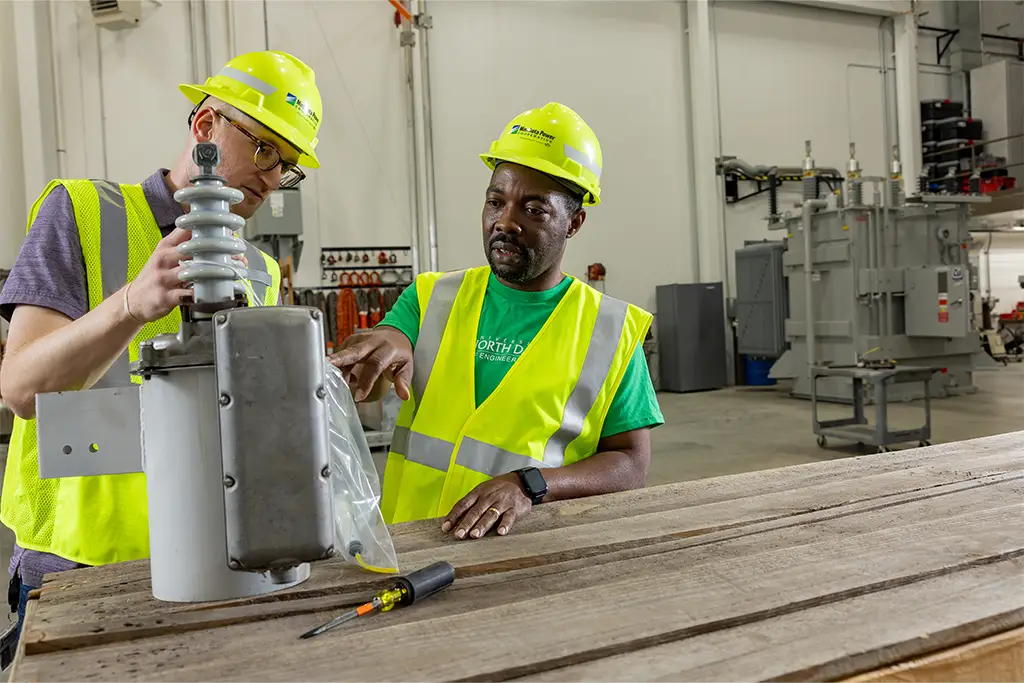
Some students extend their timeline to five years by participating in co-op programs or internships. These experiences provide valuable hands-on learning and often lead to job offers after graduation.
It’s also worth noting that in many European countries, engineering bachelor’s degrees can be completed in three years, though the programs may be more specialized from the start.
No matter the country, this degree opens the door to most entry-level engineering positions and prepares students for licensure exams or graduate studies.
Master’s Degree in Engineering (1-2 Years)
A master’s degree in engineering typically takes one to two years after earning a bachelor’s degree. It allows students to deepen their expertise in a specific field, such as biomedical, aerospace, or environmental engineering. These programs are popular among engineers seeking to transition into leadership roles, change specialties, or enhance their earning potential.
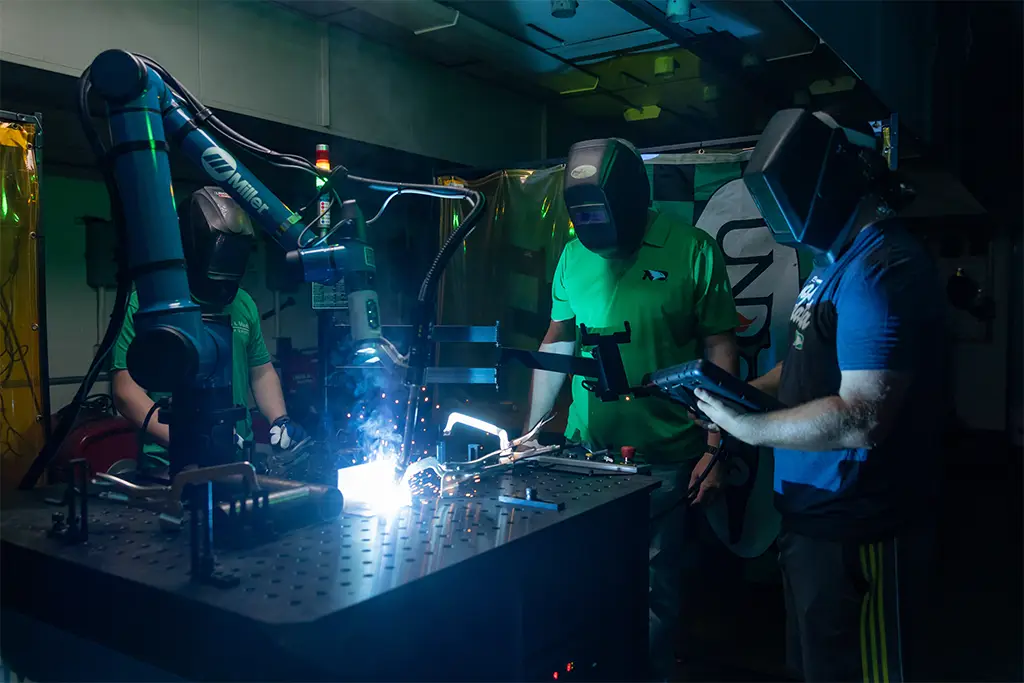
There are generally two types of master’s programs: thesis and non-thesis. A thesis-based program includes research and a final written project, which can be helpful for those considering a PhD later or who want to work in a research or lab focused career. Non-thesis options often focus on coursework and are more practical for working professionals in industry outside of research & development roles.
At UND, students can explore a variety of master’s programs, such as:
- Master of Arts in Geological Engineering
- Master of Science in Mechanical Engineering
- Master of Science in Chemical Engineering
Many universities also offer part-time or evening formats for those balancing school with a job. Whether research-driven or practice-oriented, a master’s degree adds a layer of specialization and can open the door to senior technical roles or teaching at the college level.
Ph.D. in Engineering (4-6+ Years)
Pursuing a Ph.D. in engineering is a long-term commitment, typically taking between four and six years after a bachelor’s or master’s degree. It involves advanced coursework, comprehensive exams, and several years of original research leading to a dissertation.
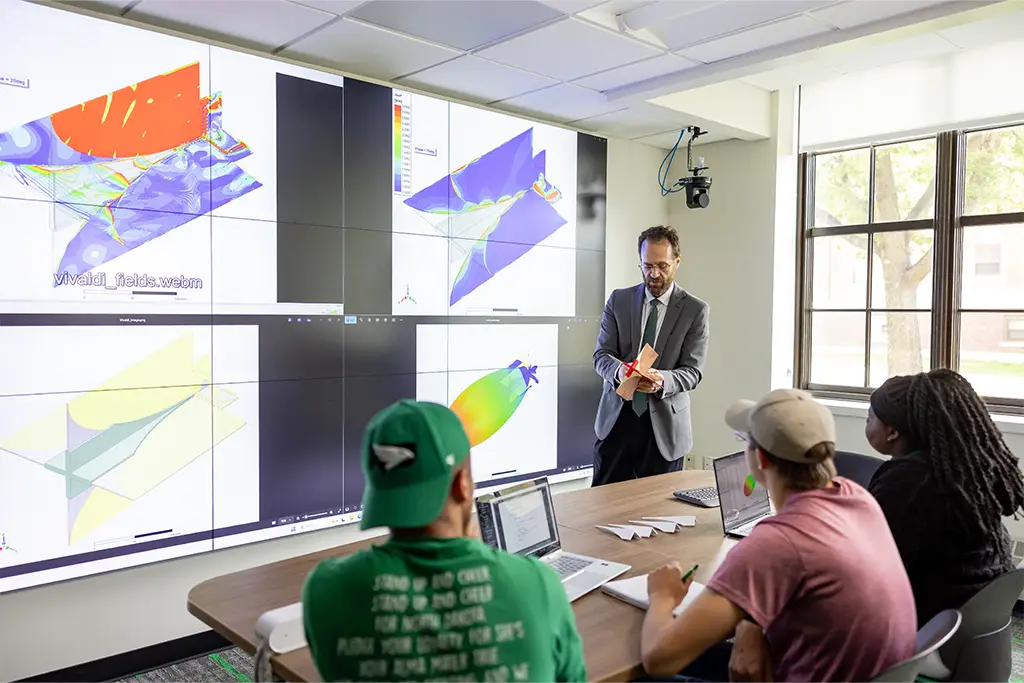
The timeline can vary based on the complexity of the research, the availability of funding, and the relationship with a faculty advisor. Some students complete it faster, especially if they enter with a master’s degree, while others may take longer due to lab work, publications, or teaching responsibilities.
A Ph.D. is ideal for those interested in academic careers, high-level research, or leadership roles in R&D departments. At UND, aspiring professionals can elevate their careers with our Ph.D. programs, including a Ph.D. in Civil Engineering, and Ph.D. in Electrical Engineering.
Graduates often become university professors, lab directors, or senior engineers at tech companies. For example, someone studying sustainable energy might spend years developing new battery technology. It’s a path for the deeply curious, those ready to push the boundaries of what's known in their field.
Accelerated or Combined Programs
Some universities offer accelerated or combined engineering degree programs that can save students both time and money. One common option is a five-year B.S./M.S. program, where students earn both a bachelor’s and master’s degree in a streamlined format.
UND offers these types of programs for high-achieving students, including an Accelerated Mechanical Engineering degree and a Combined Chemical Engineering degree.
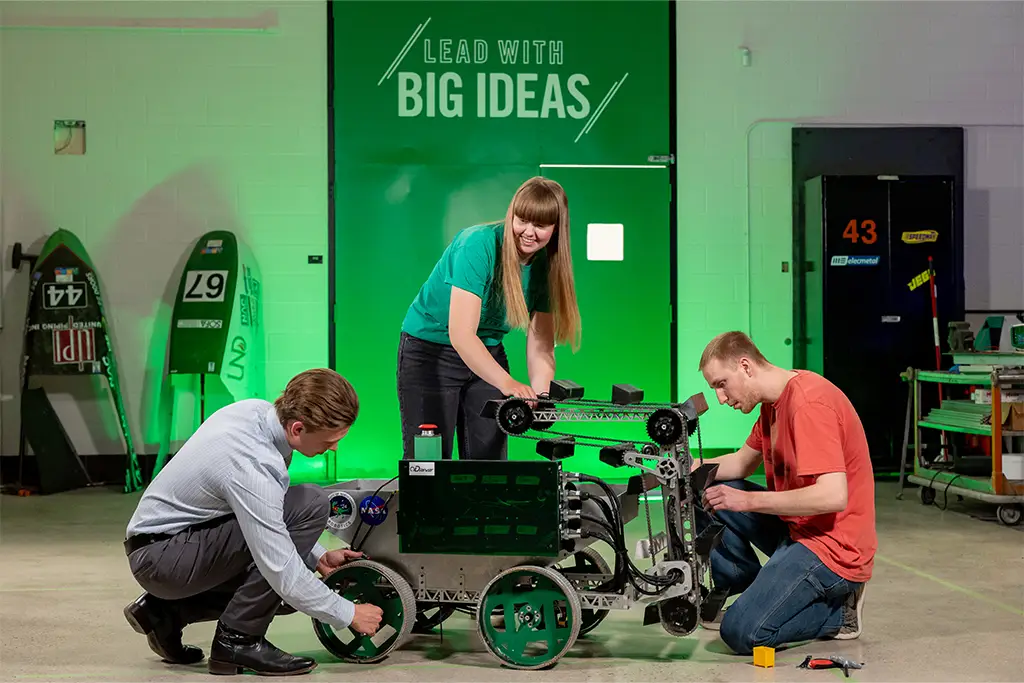
There are also some accelerated bachelor’s programs that allow students to complete their degree in three or 3.5 years by taking summer classes.
These formats are appealing to students who are highly motivated and have a clear career direction from an early stage. For example, someone interested in robotics might complete a combined program to gain both foundational knowledge and advanced skills quickly.
While not for everyone, accelerated paths can shorten the time in school and help students jumpstart their careers sooner.
Factors that Affect Engineering School Duration
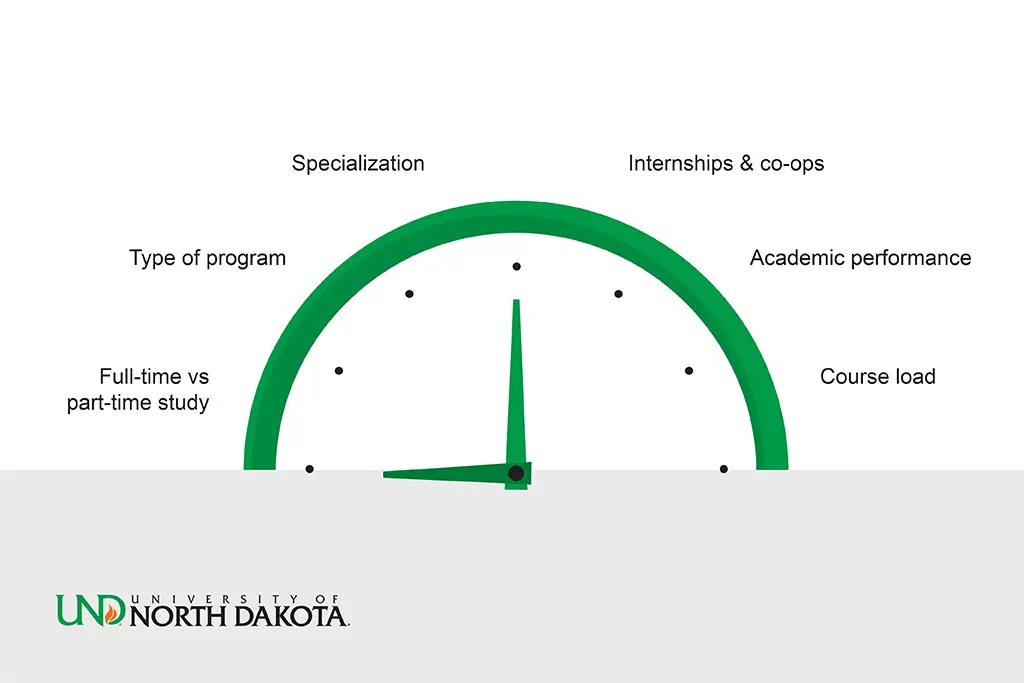
The length of time it takes to complete engineering school isn’t the same for everyone. Several factors can influence how long a student stays in school, starting with the choice between full-time and part-time study. Full-time students usually follow a standard timeline, while part-time learners, often working professionals, take fewer classes per semester and may need extra years to complete their studies.
Internships, co-ops, or work-study programs offer valuable experience but can also extend the time required to complete a degree. However, these opportunities often lead to better job placement after graduation.
Finally, academic performance and course load play a significant role. Students who take heavier loads may graduate sooner, but those who struggle with challenging subjects may need to repeat courses, thereby delaying their progress. Balancing workload and maintaining strong grades helps keep things on track.
How Long Does It Take to Become a Licensed Engineer?
Earning an engineering degree is a major milestone, but becoming a licensed Professional Engineer (PE) involves additional steps after graduation. While this process is separate from engineering school, it’s important for those who want to hold the PE title, especially in fields such as civil, mechanical, and structural engineering.
The first step is passing the Fundamentals of Engineering (FE) exam, usually taken before or shortly after completing a bachelor’s degree from an ABET-accredited program. This qualifies you as an Engineer-in-Training (EIT) or Engineering Intern (EI).

Next comes the experience requirement. Most states in the U.S. require four years of work under the supervision of a licensed engineer, but it varies by state. This time allows you to apply classroom knowledge in real-world projects and develop professional judgment.
After meeting the experience requirement, you can sit for the Principles and Practice of Engineering (PE) exam. Passing it grants the official PE license, allowing you to sign off on projects, work independently, and offer services to the public.
From graduation to licensure, the full process usually takes five or more years. While not all engineering careers require a PE license, it adds credibility and can lead to greater responsibility, higher pay, and leadership roles.
Conclusion
Engineering school can take anywhere from two to six years or more, depending on the degree level, pace of study, and career goals. Some students begin with an associate's degree, others aim for a Ph.D., and many choose combined or accelerated programs.
Each path comes with its own timeline and opportunities. Some lead straight into the workforce, while others open doors to research, leadership, or advanced technical roles. What matters most is choosing a program that aligns with your interests and goals.
The University of North Dakota offers a wide range of engineering programs to help you get there, so explore your options today and find the path that fits you best.
FAQs
Engineering is considered one of the more challenging majors due to its heavy focus on math, science, and problem-solving.
Many graduates find jobs before graduation or within about six months after, especially if they’ve completed internships or co-ops. But it varies by region, industry, and major over time.
Yes, as long as the program is accredited and offers strong coursework, most employers value online engineering degrees that are ABET accredited and have similar structures to those offered to in person students. Another way to prove that you have learned what is needed in engineering is to take and pass the FE exam.